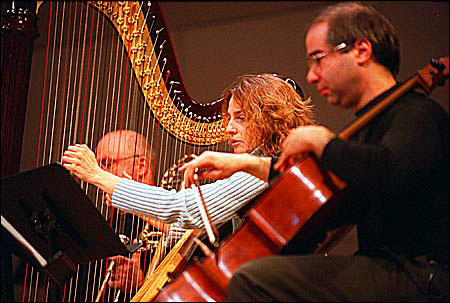Ringing in the new
Fromm Concerts bring contemporary music superstars to Harvard

Heterophony, polyvocality, and sound diffusion are not terms that typically come up in casual conversations about music. But these elements are the stock in trade of contemporary music, a genre that was on dazzling display at Paine Concert Hall last weekend (March 4 and 5) as some of its most acclaimed composers and practitioners performed at the Fromm Concerts.
The Fromm Music Foundation at Harvard University, which was founded by philanthropist and new music patron Paul Fromm in 1952, has sponsored annual concerts since 1993, but last year marked a turning point: Instead of supporting performances spread out over the course of the semester and bringing in world-class artists for a few days at a time, Joshua Fineberg, the John L. Loeb Associate Professor of the Humanities, curated the first Fromm Festival, in which performances could be concentrated into a single weekend. Last year, the Fromm Festival’s theme was “Solo/Tutti: The Evolution of the Concerto and the Soloist.” It was so successful that the format was reprised this year.
The aural tour conducted last Friday and Saturday was a journey through the landscape of “Multiple Voices.” Elliott Gyger, the curator and an assistant professor in the Music Department, selected works by significant figures in the genre, musicians whose styles are as varied as, say, Kenny Rogers and The Clash. Experienced over the course of the two evenings, the works comprised a survey class in the different ways voice and text can be used in composition.
To someone with an ear that’s not schooled in the technical and tonal aspects of composition, one’s instinct would likely lean toward applying words like atonal, dissonant, and twitchy to the compositions performed at Friday night’s concert. The roster included works of electronic artist Steve Reich, and composers Kaija Saariaho, Peter Maxwell Davies, and Elliot Carter, who’s still composing at the ripe age of 96 and whose work is described as the most complex in its class by many who are conversant in the genre.
New music aficionados are the first to acknowledge its limited appeal. “A concert like this doesn’t have much to do with the outside world. The major virtue is gathering a community of interested people in a place to hear the music of colleagues,” said Yehudi Wyner, a composer and retired Brandeis professor (who also taught at Harvard for four years). “It’s not very public music. It’s not music that’s alluring to a broad population. Some might call it ‘insular,’ ‘parochial,’ ‘academic,’ ‘narcissistic,’ or ‘idealistic.’” Wyner, whose latest work was premiered by Boston Symphony Orchestra last month with Robert Spano conducting, described new music as “abstract purity.” It hinges, he said, on the “experience of sound.”
Last Friday’s performance, which focused on duets, drew more than 125 people to listen to musicians brought in from around the country. Intense rehearsals began just a week before, but you’d never know given how expertly the ensembles pulled off these complex compositions.
The Fromm Foundation established these concerts, which are free and open to the public, for the purpose of performing works that are typically too challenging for small groups to produce because of money and time limitations, unusual combinations of instrumentalists, or the need for special equipment. Such events are unusual in the area, despite the fact that a number of ensembles and choirs throughout Greater Boston try their hands at the genre and that most of the city’s conservatories have groups that specialize in the genre. Many graduate students in composition programs are influenced by new music’s composers, which, according to curator Gyger, is only natural given music’s development throughout history.
“Within the music – and new music – community, there’s this continuity in the way composers learn from what previous generations have done,” Gyger said. “The pace of change accelerated in the 20th century. Technological abilities changed so much. If you take someone born in 1700 and plunk them into 1800, there would not be that many things unfamiliar to them. But if you take someone born in 1900 and plunk him down in 2000, technology is so different – and music has accelerated in the same way.”
In terms of artistic evolution, these composers appear to have simultaneously revolted against and paid homage to their predecessors. They rip the rug out from traditional formats and designs, cut it into shreds, and put the radically contorted but elaborately reassembled objet d’art on display.
Jeffrey Milarsky, a new music expert and a professor at Columbia University, conducted last weekend’s event, his fourth time at Harvard for Fromm Concerts.
“It’s very focused,” he said. “It’s a wonderful feeling … to accomplish what we all came here to accomplish. It’s such a truncated time spent rehearsing. We [musicians] are worried about contemporary music because it’s so difficult. It’s nice to get to a level when we feel … like we can handle it.
“It’s an accomplishment to do such different pieces,” Milarksy continued. “If the composers were here, they’d be thrilled! The effort is what the composer responds to, how much integrity you, as musicians, bring to it. They’d be thrilled not because we played it flawlessly, but because the energy was there. Harvard is a magical place for making it happen.”




